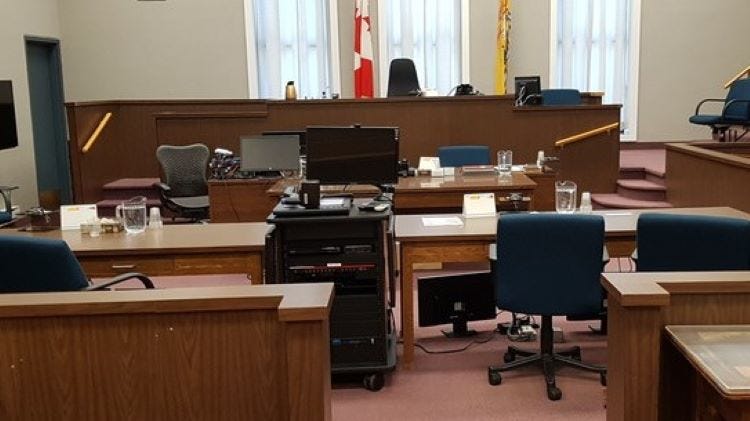Judge halts sex-assault prosecution
Defence successfully argues Joshua Henry Baldwin’s rights to speedy trial were violated due to repeated delays, resulting in court order to stay proceedings in case
A southern New Brunswick man’s trial on a sexual-assault charge from two years ago will proceed no further, as a judge ruled Tuesday the Crown violated his right to a timely trial.
The trial for Joshua Henry Baldwin, 38, of Little Lepreau, N.B., got underway earlier this year in Fredericton provincial court on an indictable charge of sexual assault.
The count alleged Sept. 25, 2021, events in Hampstead, about 80 kilometres southeast of Fredericton.
But in August, defence lawyer T.J. Burke filed an application with the court for a stay of proceedings in his client’s case, arguing Baldwin’s rights under Section 11(b) of the Charter of Rights and Freedoms had been violated.

That section reads, “Any person charged with an offence has the right… to be tried within a reasonable time.”
Judge Lucie Mathurin rendered her decision on the defence application Tuesday and granted the request for a stay of proceedings in the case. Such a stay means the case is essentially halted and will proceed no further.
“There have been a number of delays,” the judge said Tuesday, enough that the threshold for an excessive delay has been reached, as outlined in a key precedent.
In a decision called R v. Jordan, the Supreme Court of Canada ruled that criminal matters in provincial courts should take no longer than 18 months from the time a charge is laid to the end of a trial, barring exceptional circumstances.
“These are circumstances arising outside the Crown’s control,” Mathurin said, noting there was nothing that met that bar in the Baldwin case.
The trial began in June, she said, and had originally been scheduled for a single day of court time. Mathurin noted that the trial got underway late on the first morning due to discussions between Crown and defence over a late disclosure issue.
It quickly became clear the prosecution, with numerous pending witnesses, wouldn’t get through its case in one day and requested an adjournment for an additional day or two for the trial, the judge said.
The case was set to resume before the court Aug. 9, she said, but at that time, prosecutor Kathleen Jacobs unexpectedly closed her case, opting not to call the other expected witnesses.
Given the change in Crown evidence, the defence requested an adjournment, noting it needed time to review the new state of the case, Mathurin said, noting that was proper.
The defence wasn’t available until December for trial continuation, which would bring the case to 22 months from the time the charge was laid to the time of the expected conclusion of the trial.
The defence filed its Charter application, noting the case had gone over the 18-month deadline.
The Crown had argued there were delays attributable to the defence that brought the case under the 18-month threshold once they were factored in, citing the defence’s unavailability until December for the conclusion of trial as one such delay.
But Mathurin said the delay from August to December was a reasonable one for the defence to request, given that it had been blindsided by the cancellation of expected Crown witnesses.
“The defence request for an adjournment was not a defence delay,” she said. “The adjournment was sought as a result of a new development that had to be assessed.”
At most, the judge said, there were two months that could be attributed to defence delay in the case. That left a balance of 20 months of delay, most of which Mathurin attributed to the Crown.
The judge noted a key delay earlier this year came when the Crown provided late disclosure of additional information to the defence on the day the trial was set to begin, which is why proceedings started later than scheduled on the first day of the trial.
Mathurin described that late disclosure of evidence as “disingenuous,” and she used the same term for Jacobs’ decision to close the Crown’s case suddenly without calling expected witnesses.
When a deadline under R v. Jordan looms in a case, the judge said, the Crown has a duty to take action to mitigate the problem, and it needs to show the court it took steps to avoid exceeding the timeframe as set out in the Supreme Court of Canada precedent.
Mathurin said in the Baldwin matter, the Crown did take some meaningful steps to bring the case in under the 18-month deadline.
“Unfortunately, those steps came at the 11th hour in the process,” the judge said.
“The defence was doing its part to move this case forward expeditiously.”
Mathurin also noted that there were several pre-trial proceedings in the case, and at no time did the Crown suggest in those earlier appearances that more than a single day of court time would be needed for the trial. That only came to light when the trial began, she said, suggesting that had the issue been addressed earlier, additional delays could have been avoided.
After Tuesday’s proceeding, Burke told the Fredericton Independent the biggest delay in the case stemmed not from the prosecutor, but the RCMP.
He said the Mounties sought a warrant for Baldwin’s DNA 13 months after the charge was laid, and that accounted for the lion’s share of the delay.
The defence lawyer said while his client is relieved the case is concluded, it’s not an ideal outcome either.
“There’s never any winners or losers in this type of case,” Burke said.
Don MacPherson can be contacted at ftonindependent@gmail.com.





Requesting a warrant 13 months after the charge for DNA does seem a little odd